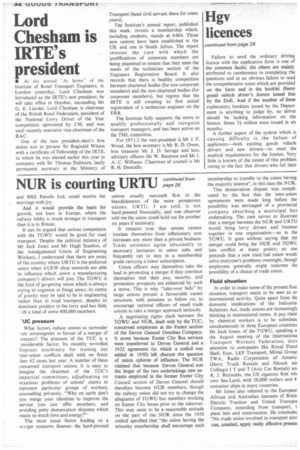NUR is courting URTU
Page 34

If you've noticed an error in this article please click here to report it so we can fix it.
and BRS Parcels Ltd, could receive the marriage with joy.
And it would provide the basis for growth, not least in Europe, where the railway lobby is much stronger in transport than it is in Britain.
It can be argued that serious competition with the TGWU would be good for road transport. Despite the political intimacy of Mr Jack Jones and Mr Hugh Scanlon, of the Amalgamated Union of Engineering Workers, I understand that there are areas of the country where URTU is the preferred union when AUEW shop stewards are able to influence which union a manufacturing company's drivers will join. The TGWU is the kind of go-getting union which is always trying to organize in fringe areas; its centre of gravity may be said to be in engineering rather than in road transport, despite its dominant position in the lorry and bus field, ith a total of some 400,000 members.
VC pressure What factors induce unions to surrender heir sovereignties in favour of a merger of aterests? The pressure of the TUC is a -onsiderable factor. Its recently revivified Jisputes machinery for ironing out :nter-union conflicts dealt with no fewer ,han 62 cases last year. A number of these concerned transport unions. It is easy to imagine the chairmen of the TUC's impartial committees, adjudicating on vexatious problems of unions' claims to represent particular groups of workers, counselling privately: "Why on earth don't you merge your identities to improve the service you can offer members, and avoiding petty demarcation disputes which waste so much time and energy?"
The most usual factor leading to a merger concerns finance: the hard-pressed unions usually succumb first to the blandishments of the more prosperous unions. URTU, I am told, is not hard-pressed financially, and one observer told me the union could hold out for another six years if necessary.
It remains true that unions cannot insulate themselves from inflationary cost increases any more than a private business. Trade unionists agree reluctantly to necessary increases in union subs and frequently opt to stay in a membership grade carrying a lower subscription.
Union officers may themselves take the lead in promoting a merger if they convince themselves that their pay, security, and promotion prospects are enhanced by such a move. This is why "take-over bids" by large unions present a favourable career structure, with pensions to follow on, to encourage national officers of small trade unions to take a merger approach seriously.
A negotiating rights clash between the TGWU and NUR, dealt with by the TUC, concerned employees at the Exeter section of the Devon General Omnibus Company. It arose because Exeter City Bus services were transferred to Devon General and a 1932 agreement (to which a codicil was added in 1950) left obscure the question of union spheres of influence. The NUR claimed that because Devon General was the larger of the two undertakings new entrants employed in the former Exeter City Council section of Devon General should therefore become NUR members, though the railway union did not try to change the allegiance of TGWU bus members working on Exeter City buses prior to the takeover. This may seem to be a reasonable attitude on the part of the NUR since the 1950 codicil specified that "the union having the minority membership shall encourage such membership to transfer to the union having the majority interest", in this case the NUR.
This demarcation dispute was complicated by the fact that the inter-union agreements were made long before the possibility was envisaged of a provincial company absorbing a municipal bus undertaking. The case serves to illustrate that a merger between the NUR and URTU would bring lorry drivers and busmen together in one organization—as in the TGWU. It goes without saying that the merger could bring the NUR and TGWU into conflict at many points; no one pretends that a new road /rail union would solve everyone's problems overnight, though employees generally might welcome thc possibility of a choice of trade union.




















































































































